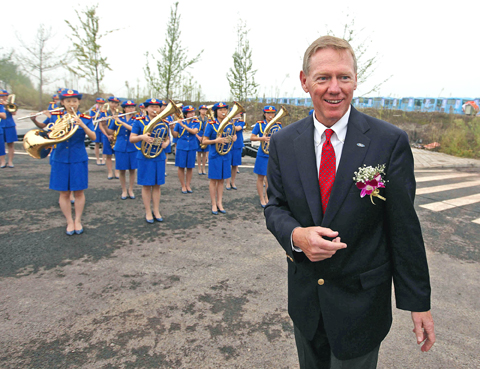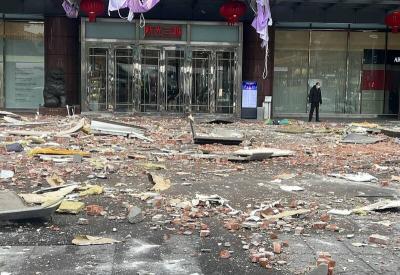Ford Motor Co said yesterday it plans to spend US$490 million on building a third assembly plant in China, ramping up production to meet surging demand in this fast-growing market as it expands in Asia.
The factory, to be built in the central Chinese city of Chongqing, will make the next-generation Focus compact car, which Ford plans to sell globally.
The announcement from Chongqing came the day after the Dearborn, Michigan-based automaker unveiled a made-in-India compact car — part of a drive to boost sales in Asia, a region the US automaker has hardly dented but is counting on to drive growth.

PHOTO: BLOOMBERG
“Today’s announcement reinforces our commitment to the further expansion of our China operations to meet the continued rise in demand from Chinese consumers for world-class Ford products and services,” Ford chief executive Alan Mulally said in a statement.
While in India earlier this week, Mulally said he expects one-third of global car sales to come from Asia in 20 years, a third from the Americas and a third from Europe and Russia.
China is proving a lifesaver for all the big automakers, helping offset declining sales elsewhere.
Total sales in the first eight months of the year rose to 8.33 million units, up nearly 30 percent from a year earlier, according to the China Association of Automobile Manufacturers. China overtook the US as the world’s largest auto market earlier this year, with sales last month jumping 82 percent from a year earlier to 1.14 million units.
The Chongqing plant, part of its joint venture Changan Ford Mazda Automobile Co, is the third for Ford in China and its second in Chongqing, an industrial hub of 30 million people sprawled along the upper reaches of the Yangtze River.
Slated for full completion by 2012, Ford said the plant will be equipped to make other small cars on the company’s global C-car platform in addition to the Focus.
Ford lags behind other automakers in Asia, capturing only 2 percent of auto sales there, compared with nearly 15 percent in North America and 10 percent in Europe.
Ford currently produces 450,000 vehicles in China annually. The new Chongqing facility will initially be able to manufacture 150,000 cars per year, with the capacity to produce 600,000 by 2012 when the plant is at full capacity, the company said.
The company says it plans to introduce four new vehicles in the Chinese market in three years.
The next-generation Focus, scheduled to debut in January at the North American International Auto Show, represents a shift toward C-segment vehicles that Ford says it expects to account for nearly 28 percent of global sales by 2013.

UPDATED (3:40pm): A suspected gas explosion at a shopping mall in Taichung this morning has killed four people and injured 20 others, as emergency responders continue to investigate. The explosion occurred on the 12th floor of the Shin Kong Mitsukoshi in Situn District (西屯) at 11:33am. One person was declared dead at the scene, while three people were declared deceased later after receiving emergency treatment. Another 20 people sustained major or minor injuries. The Taichung Fire Bureau said it received a report of the explosion at 11:33am and sent rescuers to respond. The cause of the explosion is still under investigation, it said. The National Fire

ALL-IN-ONE: A company in Tainan and another in New Taipei City offer tours to China during which Taiwanese can apply for a Chinese ID card, the source said The National Immigration Agency and national security authorities have identified at least five companies that help Taiwanese apply for Chinese identification cards while traveling in China, a source said yesterday. The issue has garnered attention in the past few months after YouTuber “Pa Chiung” (八炯) said that there are companies in Taiwan that help Taiwanese apply for Chinese documents. Minister of the Interior Liu Shyh-fang (劉世芳) last week said that three to five public relations firms in southern and northern Taiwan have allegedly assisted Taiwanese in applying for Chinese ID cards and were under investigation for potential contraventions of the Act Governing

‘INVESTMENT’: Rubio and Arevalo said they discussed the value of democracy, and Rubio thanked the president for Guatemala’s strong diplomatic relationship with Taiwan Guatemalan President Bernardo Arevalo met with US Secretary of State Marco Rubio in Guatemala City on Wednesday where they signed a deal for Guatemala to accept migrants deported from the US, while Rubio commended Guatemala for its support for Taiwan and said the US would do all it can to facilitate greater Taiwanese investment in Guatemala. Under the migrant agreement announced by Arevalo, the deportees would be returned to their home countries at US expense. It is the second deportation deal that Rubio has reached during a Central America trip that has been focused mainly on immigration. Arevalo said his

‘SOVEREIGN AI’: As of Nov. 19 last year, Taiwan was globally ranked No. 11 for having computing power of 103 petaflops. The governments wants to achieve 1,200 by 2029 The government would intensify efforts to bolster its “Sovereign Artificial Intelligence [AI]” program by setting a goal of elevating the nation’s collective computing power in the public and private sectors to 1,200 peta floating points per second (petaflops) by 2029, the Executive Yuan said yesterday. The goal was set to fulfill President William Lai’s (賴清德) vision of turning Taiwan into an “AI island.” Sovereign AI refers to a nation’s capabilities to produce AI using its own infrastructure, data, workforce and business networks. One petaflop allows 1 trillion calculations per second. As of Nov. 19 last year, Taiwan was globally ranked No. 11 for